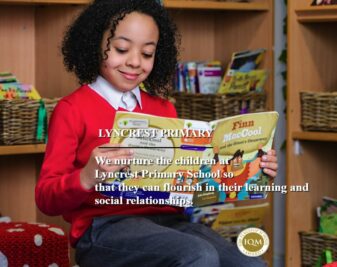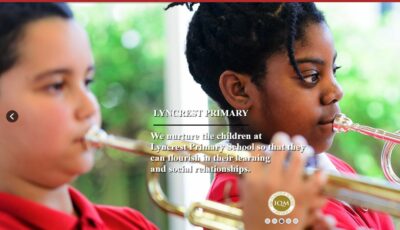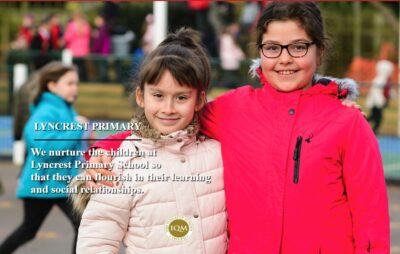Lyncrest Primary School has achieved the Inclusive School Award with Flagship status.

Total Commitment to Inclusion for All
At Lyncrest Primary School, the importance of purposeful leadership is exemplified through the direction and motivation of a Headteacher who demonstrates total commitment to inclusion for all. Her office and that of her Deputy are positioned in a discreet area of the school building with a square space immediately outside their doors. It is away from the busy administrative part of the school and has been utilized to provide a ‘calming space’ for any child who needs respite from the classroom or other children. All pupils know that this area is available, but it is most frequently visited by those with additional needs, often accompanied by a supporting member of staff.

On the day of our Assessor’s visit, the Headteacher spent quite a bit of time sitting on the floor playing draughts with a child who needs frequent breaks from the busyness of the classroom and interaction with other children. He was able to relax and feel safe as she distracted him from anxiety by playing his favourite game. This was a practical example of her commitment to meeting the needs of each child in the school and clearly demonstrated her understanding that as educators we must respond creatively if every child is to feel included.
Each morning pupils and parents are welcomed onto the school grounds by the Headteacher and a senior member of staff, giving parents the opportunity for that ‘quick word’ which they can find so reassuring. Similarly, a senior member of staff is at the school gate at the end of the day, able to respond to any worries, as they wish the pupils a happy evening.
Communication and Collaboration
Communication and collaboration between the Headteacher, her Deputy and all staff is clear and strong, ensuring clarity of vision based on an understanding of current needs. An example of this is the clear focus on pupil wellbeing demonstrated through the careful planning of the PSHE curriculum and the phase and whole-school assemblies.
Themes are carefully linked so that pupils can revisit topics and experiences from different perspectives. For example, a current plan for assemblies shows how a whole-school assembly based on International Women’s Day was followed later in the week by a phase assembly featuring Inspirational Women. Later, during Science week, the achievements of Marie Curie were explored and the teacher leading the session reminded the children of the remarkable life of a woman who was born in 1867, a time in history when women were given few opportunities for education. Famous quotes from Marie Curie were discussed such as, “Nothing in life is to be feared, it is only to be understood. Now is the time to understand more so that we may fear less”.
Understanding and Tolerance

The Spring Term assembly timetable demonstrates a range of topics that have been explored with the pupils, including autism awareness, speech and language difficulties and a range of learning and disability needs. Understanding and tolerance have been key areas of focus. Discussion with pupils serving on the School Council demonstrated the profound influence of these opportunities for learning.
The confidence and passion for inclusion expressed by these young pupils were remarkable as they listened to each other and eloquently expressed the importance of equity rather than equality. They understand the difference between equality and equity and that equality means the same opportunities and support are given to each individual, whereas equity recognises the resources and opportunities needed for equal outcomes
Candidates are chosen for the School Council by their fellow students. The respect that these young pupils show for each other, and for those in their community who have additional needs, was profound. Our Assessor was left feeling that their compassion and understanding would continue to grow in the future and influence their lives in a way that can only be imagined.
A similar discussion with the Pupil Sports Leaders demonstrated the way in which they have accepted responsibility for organising and leading lunch time sports activities. Their enthusiasm for encouraging sporting activities was evident but most importantly they understood the value of exercise and engagement in activities to make break times fun. They described the importance of simple rules and instructions and repetition for younger pupils. They also described strategies to re-engage pupils who might be a little distracted. At Lyncrest, the development of pupils as leaders is encouraged and is clearly highly valued.
The Adult Sports Leader is to be commended for the way he involves a range of pupils in local cluster sporting events. He gives pupils of all sporting abilities the opportunity to participate and recognises the importance of effort as well as natural ability.
Positive Relationships with Parents
The further development of positive relationships with parents continues to have high importance. During the day, our Assessor met with a group of 3 parents who shared information about the additional needs of their children. They spoke very openly about the challenges they face on a daily basis and the way in which school staff offer support. They described issues that had been resolved because teachers listened to them and then made simple changes which removed the potential distress for their child. For example, a pupil suffering from acute anxiety sometimes missed school because of her distress at leaving her mother. Through conversations between the teacher and parent, the cause of the child’s anxiety was identified as being a specific recall activity that is often used at the beginning of the school day. This was replaced with an alternative task that was more accessible for the child and the child’s reluctance to enter the classroom was greatly reduced.
Later, during a discussion about the openness of the parents who met with our Assessor, the Headteacher noted their appreciation of being able to sit together and talk about the needs of their children and how the school supports them. She immediately saw an opportunity to recreate similar meetings/coffee mornings so that parents could meet and share their worries, concerns, and success stories and perhaps in time, this might become their own informal self-help group.

Another parent of a pupil with significant needs met with our Assessor separately and shared the distressing yet hopeful journey that his family and school leaders are making, as they work towards securing specialist intervention for the child. He praised the unending professional support from school staff and the way in which they are engaging with criteria from outside agencies. Responding to a moment-by-moment assessment of the child’s needs, staff work patiently with him to ensure, as far as possible, his inclusion within the learning community.
School Governance is Strong
School governance is strong, and the Chairperson is also responsible for inclusion and SEND. Her professional role as a Speech and Language Therapist means that she is familiar with the work of many schools and is well placed to advise and support. She is also the Chairperson of the Parent, Teacher, Friends, Association (PTFA). As a parent, she can observe the work of the school very closely and is full of admiration for the way it is led by the Headteacher, senior leaders, class teachers and the support team. She understands the key aims of the school and leads a diverse, active, and supportive governing body.
The skills of individual members of staff are recognised and celebrated. They feel empowered to lead their allocated subject areas and are given support and time to develop this essential work. For example, they are released from their usual commitments to enable them to visit lessons and meet with other professionals. As subject leaders, they can then review progress and plan next steps for their area of responsibility. Focused time is given to these developments as part of the performance management procedure. Before their meeting with a senior leader, staff are asked to prepare by completing a standard form/action plan to capture their ideas and aspirations.
The Site Manager is highly valued for his contribution to the wellbeing of the entire school community. He understands the school values and contributes to the ethos by giving awards to those year groups who show the greatest respect for the learning environment.
Core Values of the School
Wellbeing and independent learning are strong features that underpin the core values of the school. The Forest School Leader described how she has developed part of the outdoor learning area to engage pupils in their own assessment of risk and independent learning. Her creative but clear and strong message ensures that teachers do not do the thinking for the pupils but are helped to face problems and find solutions of their own. Skills that have an element of risk are taught. For example, they learn how to make and use ‘fire’ safely, using tools that in some settings might be handled by adults only.
Underpinning this approach is the desire to remove obstacles to learning and create opportunities for truly child-centred learning. Self-esteem and self-belief are enhanced as children start to overcome fears such as tree climbing or often surprising everyone by taking the lead for the first time.

The newly appointed SENDCo is also the Nursery Lead. She stressed the importance of meeting the needs of all pupils within the classroom setting and during the assessment day there were several examples of children receiving one to one support alongside their peer group. Currently there are 6 pupils with EHCPs with others going through the assessment process.
She stressed the importance of mental wellbeing and how pupils are exhibiting anxiety both within and outside of the school setting. She identified one KS2 year group in particular, where individuals seem to be exhibiting the highest level of need.
She also drew attention to the ‘Covid 19 babies’ in her Nursery class who are now aged between 3 and 4 years. Many remember the young fearful faces, who due to the various lockdowns, were not used to interacting with anyone but their parents and close family members. Staff are noticing communication and interaction problems which they suspect started to emerge from periods of social isolation at a critical time for emotional development.
Emanates Kindness
The Pastoral Support Worker (PSW) is new to her position and knows many of the children extremely well. She also described her role as often being focussed on pupils with wellbeing or mental health concerns. She recounted the way she has recently supported children suffering the bereavement and others needing reassurance and adjustments to the learning environment. She emanates kindness and children and staff know that they can turn to her for support.
A close working relationship between the Headteacher and her Deputy inspires confidence by developing trusting relationships. They work together to enable innovative thinking that brings the school team together as a force for school improvement. Although the school first achieved Flagship status some years ago, the staff are still discovering new ways to improve and extend the living culture of inclusive practice. Strong leadership means that people come together to make great things happen.
Find out more about the IQM Inclusive School Award
If your school is interested in obtaining the IQM Inclusive School Award or you wish to talk to a member of the IQM team please telephone:
028 7127 7857 (9.00 am to 5.00 pm)
or email: [email protected] for further details.
Want more information on the IQM Award? Click here to request your free IQM information pack.